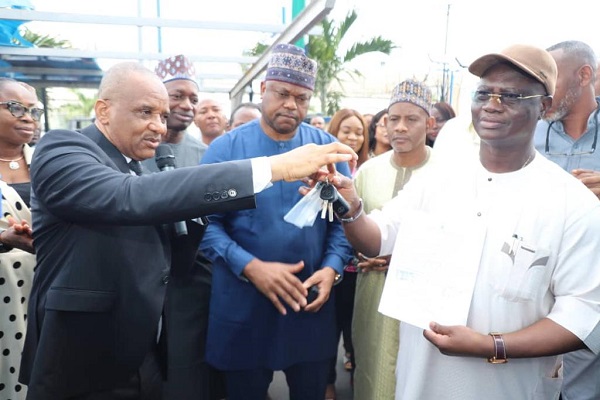
The Nigerian Maritime Administration and Safety Agency (NIMASA) and the Maritime Workers Union of Nigeria (MWUN) have restated their commitment to continuous stakeholder engagement in the maritime sector.
This was reiterated by the director-general of NIMASA, Dr. Bashir Jamoh and the president-general of the Maritime Workers Union of Nigeria, Comrade Adewale Adeyanju during a ceremony held in Lagos where NIMASA handed over a 16-seater bus and one Hilux to the union as part of the agency’s corporate social responsibility.
Jamoh commended the union for their use of dialogue in ensuring and maintaining peace in the maritime sector, which has contributed to the peace and industrial harmony witnessed in the sector in recent years. He also charged the Union to continue supporting the policies and instruments of the International Labour Organisation (ILO) to ensure better welfare and decent work for seafarers.
The DG also assured the union that the agency would complete the renovation of the headquarters of the union to give them a befitting habitation. Adeyanju expressed the union’s gratitude to the Management of NIMASA and assured them that they will continue to work closely with the various stakeholders in the sector to ensure continuous progress. He also urged terminal operators, government agencies and other major maritime players to emulate NIMASA in the discharge of their CSR projects.
Adeyanju, who is also the national vice-president of the Nigerian Labour Congress, commended the leadership of NIMASA under Jamoh and urged the Federal Government to consider a second tenure based on performance. He stated that the era of confrontation in the maritime sector is gone and the union has embraced dialogue, which has ensured sustained peace and harmony.
The MWUN president-general went on to praise Jamoh’s leadership, stating that he deserves a second term in office based on his achievements in staff welfare, regular staff promotion and attending to the needs of stakeholders. He added that Jamoh has made dialogue a way of life at NIMASA and resolving labour-related issues has been seamless under his leadership. The union charged Jamoh to continue as they will continue to support the humanitarian policies of NIMASA’s management.
In conclusion, the commitment of NIMASA and MWUN to continuous stakeholder engagement in the maritime sector is commendable. This will aid in maintaining peace and industrial harmony in the sector, leading to more success.
The exchange of the vehicles is also a great gesture of corporate social responsibility by NIMASA and the completion of the renovation of the headquarters of the union will provide a better working environment for its members.
Finally, the call by the union for other major maritime players to emulate NIMASA in the discharge of their CSR projects is worthy of emulation.

